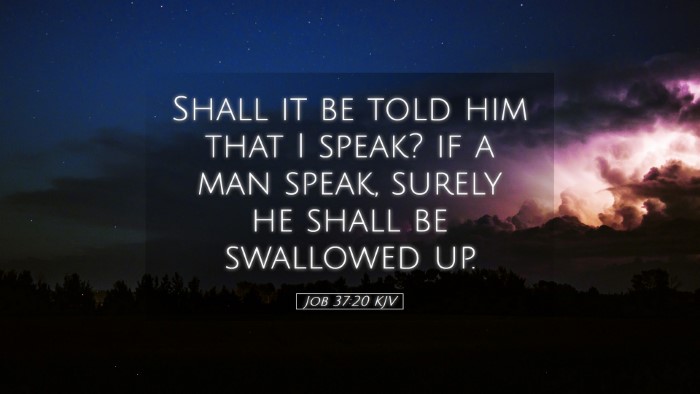Old Testament
Genesis Exodus Leviticus Numbers Deuteronomy Joshua Judges Ruth 1 Samuel 2 Samuel 1 Kings 2 Kings 1 Chronicles 2 Chronicles Ezra Nehemiah Esther Job Psalms Proverbs Ecclesiastes Song of Solomon Isaiah Jeremiah Lamentations Ezekiel Daniel Hosea Joel Amos Obadiah Jonah Micah Nahum Habakkuk Zephaniah Haggai Zechariah MalachiJob 37:20
Job 37:20 KJV
Shall it be told him that I speak? if a man speak, surely he shall be swallowed up.
Job 37:20 Bible Commentary
Commentary on Job 37:20
Job 37:20 says: "Shall it be told him that I speak? If a man speaks, surely he shall be swallowed up." This verse opens a window into a profound conversation concerning human communication and the divine understanding of our expressions. The complexity of this verse is echoed throughout the commentaries of esteemed biblical scholars.
Contextual Background
In the Book of Job, we find a narrative that portrays intense dialogues between Job and his friends, exploring themes of suffering, divine justice, and the nature of God. This particular verse stands out as it reflects Job's response to the overwhelming presence of God, especially when confronted with the majesty of creation as depicted by the whirlwind in the succeeding chapters.
Insights from Matthew Henry
Matthew Henry, in his commentary, emphasizes the notion of God's omnipotence and the limits of human speech when faced with divine majesty. He remarks:
- Divine Majesty and Human Limitation: Henry asserts that the immenseness of God renders human discourse almost futile. He suggests that in moments of divine revelation, human words seem inadequate to capture the essence of the divine.
- The Weight of Communication: He posits that to speak before God is to court the risk of being “swallowed up” by the weight of what one might say. This indicates a reverent fear of speaking frivolously in the presence of divine authority.
Insights from Albert Barnes
Albert Barnes adds another layer of interpretation, focusing on the impact of human suffering on the perception of God’s justice and power.
- The Nature of God’s Communication: Barnes argues that Job's rhetorical question encapsulates a fear—a fear that expressing his distress to God would only highlight human insignificance and provoke further divine silence.
- The Human Response: Barnes notes that this expression is one of both awe and despair, where Job grapples with the reality of his pain and the perceived indifference of God.
Insights from Adam Clarke
Adam Clarke's commentary explores the linguistic and theological dimensions of the text. He observes:
- Theological Implications: Clarke reflects on how Job’s question exposes a deep theological concern about man’s ability to plead his case before God, emphasizing the fear of being overwhelmed by God's presence.
- Human Fear of Divine Retribution: He notes that Job’s concern about being “swallowed up” signifies a painful acknowledgment of sin and the fear of divine judgment, which undermines the capacity to communicate openly.
Application for Pastors and Theologians
The significance of Job 37:20 extends far beyond its immediate context. For pastors, this verse invites reflection on the nature of prayer and communication with God:
- Encouraging Authentic Communication: Pastors can use this verse to emphasize the importance of honest dialogue with God, reassuring congregants that expressing grief or doubt is not only acceptable but necessary.
- Teaching Humility Before God: This verse serves as a reminder of the vast chasm between divine wisdom and human understanding, urging believers to approach God with a spirit of humility.
Conclusion
Job 37:20 encapsulates a profound theological truth regarding the nature of God and our place as humans. Through the insights from commentators like Matthew Henry, Albert Barnes, and Adam Clarke, we come to understand the heavy nature of human speech in the presence of the divine. This verse not only calls for reverence and humility but also invites believers into a genuine relationship with God, marked by authenticity despite the limitations of human expression. In the light of suffering and divine majesty, we are reminded that while our words may falter, our hearts can always seek the presence of God.


